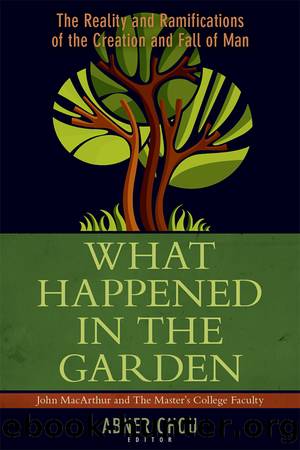What Happened in the Garden by Abner Chou

Author:Abner Chou
Language: eng
Format: epub
Publisher: Kregel Publications
CHAPTER 6
THE SEED AND SCHAEFFER
William Varner
In 1968 Francis Schaeffer published a little book titled Escape from Reason, but its popularity and effect far outdistanced its short compass (125 pages).1 Schaeffer accused modern thought, which he traced back to Aquinas, as being guilty of attempting to operate in a divided field of thought. He called this the upper and lower stories. These two divisions were originally called “nature” (lower story) and “grace” (upper story). These two “stories” would be called by other names throughout the following centuries. According to Schaefer, the dualism of history (lower) and faith (upper) has strongly influenced the discussion of religious thought and belief from pre-modern days into the current post-modern ideas.
As Schaeffer described the scene, religious existentialism recognized the lower sphere as one field, the realm of history and bald facts. The upper sphere, on the other hand, was the realm where faith was affirmed.2 German neo-orthodoxy could use two different terms for “history.” Historie could describe the lower story; Geschichte could describe the upper story of history. Theologians adopted a word coined in the nineteenth century, Heilsgeshichte (literally “holy history”), to describe the “salvation history” that could exist in the upper story, without necessitating that it described the space-time events of history in the lower story.3
The danger of all of this, however, was the idea of exercising faith when there was no possibility of any historical basis for such a faith. In any case, the upper sphere was that of faith and it mattered not, to the religious existentialist, if there were any verifiable facts in the lower sphere that formed the basis of that faith. In essence, such faith could be described as “faith in one’s faith,” not faith in some objectively verifiable events in space-time history.4
While Schaeffer’s analysis of the complexity of modern philosophy and culture was often criticized as overly simplistic, it does offer a paradigm that can be useful in addressing some of the issues raised in this book. Did the events that are related in Genesis 3 really take place in space-time history (Schaeffer’s lower sphere) or can we Christians be satisfied with affirming faith in the message that these stories convey (his upper sphere) without any concern that they actually took place?5
The purpose of this chapter is twofold: (1) to investigate whether the promise that is enunciated in Genesis 3:15 can really be called a prophecy that predicts a coming deliverer commonly called the Messiah; and (2) to investigate whether it is really that important to affirm the actual existence of Adam, Eve, and the serpent as the characters mentioned in that chapter who figure in that promise. In other words, is there a harmony or a disjunct between the history described in Genesis 3 and faith in the message conveyed by those events?
Download
This site does not store any files on its server. We only index and link to content provided by other sites. Please contact the content providers to delete copyright contents if any and email us, we'll remove relevant links or contents immediately.
Hebrews, James by George H. Guthrie & George H. Guthrie(453)
Ideology by Eagleton Terry;(445)
Israel: Ancient Kingdom or Late Invention? by Daniel I. Block(442)
The 9.9 Percent by Matthew Stewart(423)
Take Back Your Time by Christy Wright(411)
The New Oxford Annotated Bible with Apocrypha by unknow(410)
Eating the Bible by Rena Rossner(405)
Insights on Hebrews by Charles R. Swindoll(402)
The Book Every Leader Needs to Read by 48 Authors(397)
Psalms, Proverbs, Ecclesiastes, and Song of Songs by John W. Hilber & Tremper Longman III & Duane Garrett(370)
Commentary on the Torah by Richard Elliott Friedman(346)
Commentary on James (Commentary on the New Testament Book #16) by Robert H. Gundry(345)
Judges: Volume Two by unknow(340)
The Jew in the Lotus by Rodger Kamenetz(337)
Who Wrote the Bible? by Richard Elliott Friedman(335)
NKJV, Ignite, eBook by Thomas Nelson(331)
Job, Ecclesiastes, Song of Songs by August H. Konkel & Tremper Longman III(329)
Proverbs, Ecclesiastes, Song of Solomon (Ancient Christian Commentary on Scripture) by J. Robert Wright(325)
Reading the Bible with Rabbi Jesus by Tverberg Lois(308)
